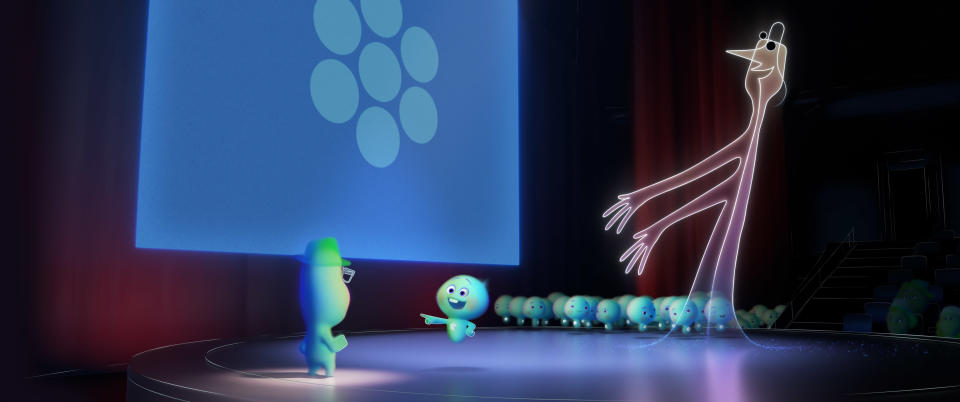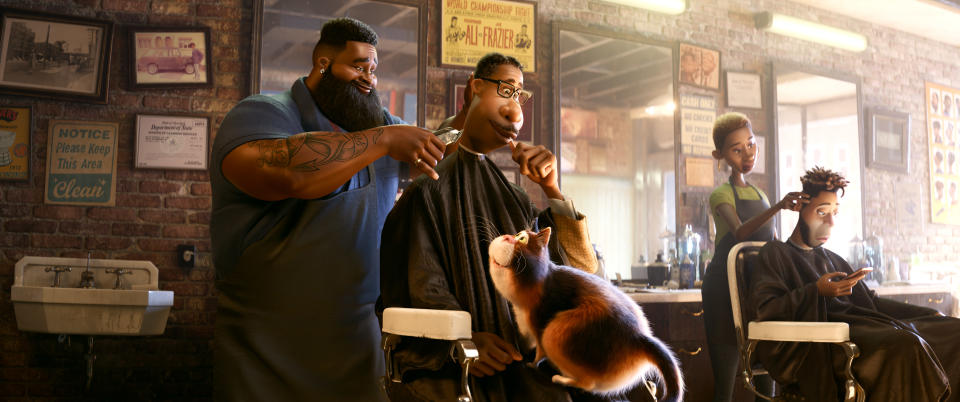'Soul' creators go inside Pixar's first African-American-led film: 'Animation is not an industry where there's been a great deal of Black representation'
To quote the great Sam Cooke, it’s been a long time coming.
The upcoming animated adventure Soul will mark Pixar’s 22nd release, when it arrives this holiday season, bypassing theaters and going straight to Disney+. However, Soul marks a milestone in the Disney-owned studio’s two-decade, Oscar-honored run, being the first film to feature a Black protagonist. Jamie Foxx voices Joe, a music teacher and struggling jazz musician who may finally be on the brink of getting his Big Break. That’s just when he suffers an accident and winds up on the brink of dying, with his soul transported to the afterlife — and then to a realm of preexistence, when he befriends a rascally soul named 22 (Tina Fey), who resists birth.
“I mean, animation is not an industry where there has been a great deal of Black representation. It just hasn’t,” Kemp Powers, the film’s screenwriter and co-director, said during an early press conference where he was joined by director Pete Docter and producer Dana Murray. “I feel that Pixar is one of the few places that's been very genuine in recognizing the shortcomings and making a tremendous, tremendous effort to start to rectify it. And I think this film is like that first effort.”

In a separate interviews with Yahoo Entertainment, the three addressed those “shortcomings.” For his part, the accomplished Pixar pro Docter (Monsters Inc., Up, Inside Out) admits that the studio’s record was “shameful” in that regard, and that it also posed the filmmakers certain challenges, like not being able to reference their past work. “It’s the first one, so there’s a lot of pressure because you can’t say, ‘We did this there, so we’ll do that here.’ There’s been so many other characters of other backgrounds, that in a way you have more freedom because there’s a chance to compare and balance things out. In this case, we wanted to make sure that it was authentic, that we didn’t fall into cultural tropes and stereotypes. And that was not an easy process. It wasn’t smooth. It was bumpy. But we kind of leaned into that and we wanted to know if we were doing it wrong before the film came while we still had a chance to correct things.”
That meant leaning on a team of “cultural consultants” that included anthropologist and educator Dr. Johnnetta Cole, jazz pianist Jon Batiste (The Late Show With Stephen Colbert bandleader who also composed music for the film) and The Roots drummer ?uestlove, who also provides a voice in Soul. They screened the film early for an all-Black audience. But perhaps most essential was the enlisting of Powers, the former jazz critic and One Night in Miami playwright who’s poised to have a huge year with the Regina King-directed adaptation of his stage drama drawing early Oscar buzz. Powers was brought on as a writer and later also elevated to co-director.
“I think the most obvious comparison people will probably make is Pixar’s Coco, but it’s important to understand the differences,” Powers tells Yahoo Entertainment in reference to the 2017 hit with an all-Latinx voice cast that marked Pixar’s first to feature a minority lead character. “Mexico is another country, and a completely different culture separate from America whereas with Black characters, it is both a unique culture but also an American culture at the same time. So it’s a culture that’s very specific, where even though it’s American as anyone else, a lot of other Americans who aren’t Black might not have an understanding of it or know much about it outside of our creative output, namely our music and a few things like that. So it’s a bit of a tightrope walk in that regard. Jazz is American art form. Joe is an American, but he’s also a culturally specific American.”

As groundbreaking as Soul is, there has already been criticism. Along with 2009’s The Princess and the Frog and 2019’s Spies in Disguise, Soul is the latest in a troubling trend in major studio animation where Black leads seem to spend much of their screen time, well, not actually as Black people. In Princess and the Frog, Tiana became an amphibian. In Spies, Will Smith’s super agent became a bird. And in Soul, Joe becomes a small glowy manifestation of his spiritual essence.
“I think it's a legitimate concern, but it's also about context,” said Powers during the press conference. “I'm as sensitive to those things is as anyone else. And for me, it's definitely about the context in which you tell this character’s story. There were a lot of caution cones we had to put up about being sensitive for the first time telling a Black man story in an animated film, being aware of how easy it is to go off the rails. … But we've never, at any point, tried to dismiss people's concerns.”

“That's why we relied so heavily on our consultants and our trust,” says Murray. “We made sure we leaned into those difficult conversations. It was something that we didn't want to not talk about.”
Docter, meanwhile, says that the majority of the film — at least 50 percent — follows Joe’s life on Earth, while the minority is the soul world.
It feels like such perfect symmetry, the fact that a film called Soul about souls is lead by a man who clearly has soul in the musical sense of the word, but that was not actually the film’s original design.
“He was a scientist for a little while. We did a whole draft of him as a struggling actor who wanted to see his name up in the lights. There was a version of this where 22 was the main character. Where we thought, ‘What is this soul who sees Earth and is like, ‘No, I don’t want any part of that,’” Docter says.
It wasn’t until the filmmakers discovered an old video of Herbie Hancock telling a story about jazz great Miles Davis that the musician lightbulb went off. “One of our early tasks was, how do we establish a goal for our main character that we are rooting for him,” Docter says. “And musician — especially jazz musician — did that because it felt like, ‘He’s not out to be rich and famous, he just loves music.’ So that gave us a rootable goal for that character to then foil.”

When Powers came on board, one of his central missions was fleshing out Joe and assuring he had the goods to carry the story and lead the audience on his mission.
If the response to that early test screening with a Black audience, not to mention a highly impressive 35-minute preview Disney showed press last month, are any indications, Soul looks primed to be another triumph in Pixarland.
“This was actually the first time Pixar did a screening for an all-Black audience,” Powers reveals. “I'll admit, that was for me on a personal level, one of the most anxiety-inducing days I had on this film because I've spent years working on this movie that ultimately I wanted to show to my family so that they could be proud of me. And that Black audience in that theater in many ways represented my family. So I can't tell you how relieved I was at the end of that screening to hear the overwhelmingly positive reaction to it.”
Soul debuts Dec. 25 exclusively on Disney+.
Read more on Yahoo Entertainment:

